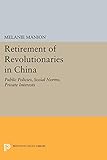Retirement of Revolutionaries in China : Public Policies, Social Norms, Private Interests / Melanie Manion.
Material type: TextSeries: Princeton Legacy Library ; 258Publisher: Princeton, NJ : Princeton University Press, [2014]Copyright date: ©1993Edition: Course BookDescription: 1 online resource (210 p.)Content type:
TextSeries: Princeton Legacy Library ; 258Publisher: Princeton, NJ : Princeton University Press, [2014]Copyright date: ©1993Edition: Course BookDescription: 1 online resource (210 p.)Content type: - 9780691605340
- 9781400863419
- 354.51001/82/09048 20
- JQ1512.Z2
- online - DeGruyter
- Issued also in print.
| Item type | Current library | Call number | URL | Status | Notes | Barcode | |
|---|---|---|---|---|---|---|---|
 eBook
eBook
|
Biblioteca "Angelicum" Pont. Univ. S.Tommaso d'Aquino Nuvola online | online - DeGruyter (Browse shelf(Opens below)) | Online access | Not for loan (Accesso limitato) | Accesso per gli utenti autorizzati / Access for authorized users | (dgr)9781400863419 |
Browsing Biblioteca "Angelicum" Pont. Univ. S.Tommaso d'Aquino shelves, Shelving location: Nuvola online Close shelf browser (Hides shelf browser)

|

|

|

|

|

|

|
||
| online - DeGruyter Ancient Greek Novels : The Fragments: Introduction, Text, Translation, and Commentary / | online - DeGruyter The Battle of the Gods and Giants : The Legacies of Descartes and Gassendi, 1655-1715 / | online - DeGruyter Taoist Ritual and Popular Cults of Southeast China / | online - DeGruyter Retirement of Revolutionaries in China : Public Policies, Social Norms, Private Interests / | online - DeGruyter Beyond the Unconscious : Essays of Henri F. Ellenberger in the History of Psychiatry / | online - DeGruyter The King of Inventors : A Life of Wilkie Collins / | online - DeGruyter Collecting: An Unruly Passion : Psychological Perspectives / |
Frontmatter -- Contents -- Figures and Tables -- Acknowledgments -- INTRODUCTION -- CHAPTER ONE. Building a Norm -- CHAPTER TWO. Politics and Policy -- CHAPTER THREE. The Decision to Retire -- CHAPTER FOUR. A Normative View of Retirement -- CHAPTER FIVE. After Retirement -- CONCLUSION -- Appendix. Survey Methods -- Works Cited -- Index
restricted access online access with authorization star
http://purl.org/coar/access_right/c_16ec
In this book Melanie Manion analyzes the largest bloodless circulation of elites in history--the massive retirement of officials in the People's Republic of China. Beginning in 1978 and continuing through the 1980s, Chinese leaders in Beijing replaced millions of old cadres, including veterans of the communist revolution, with younger generations of better educated and less generalist officials. How were the elders persuaded to retire? Manion shows how a norm of age-based exit from office, historically novel in the Chinese communist setting, was engineered by top policymakers and aided by younger cadres.Manion's research combined a wide variety of sources and methods, many new to the study of Chinese politics. The author examined hundreds of party and government documents, surveyed articles in newspapers and journals, and interviewed officials in charge of supervising cadre retirement policy. She first conducted long exploratory interviews with retired cadres, and then designed questionnaires distributed to hundreds of others for quantitative analysis. Finally, to understand the viewpoints of those with the most to gain, she interviewed younger, employed cadres. The result is a rich portrayal of manipulative leadership in post-Mao China, which reveals the key role of the private interests of all the parties involved.Originally published in 1993.The Princeton Legacy Library uses the latest print-on-demand technology to again make available previously out-of-print books from the distinguished backlist of Princeton University Press. These editions preserve the original texts of these important books while presenting them in durable paperback and hardcover editions. The goal of the Princeton Legacy Library is to vastly increase access to the rich scholarly heritage found in the thousands of books published by Princeton University Press since its founding in 1905.
Issued also in print.
Mode of access: Internet via World Wide Web.
In English.
Description based on online resource; title from PDF title page (publisher's Web site, viewed 30. Aug 2021)


